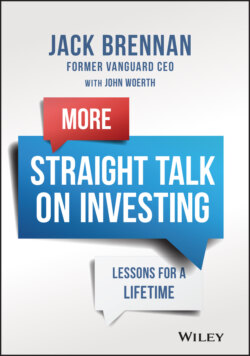Читать книгу More Straight Talk on Investing - John J. Brennan - Страница 28
Trust Yourself
ОглавлениеTrusting yourself sounds easy, but it's hard for many people to believe they can trust their own judgment about investing. So I'm going to emphasize this point: Investing takes common sense and self-knowledge, and you possess both of those already. Trust yourself to know your current financial situation, your objectives, and your tolerance for risk better than anyone else. You know your own strengths and weaknesses. Is it going to be easy for you to develop disciplined savings habits, or will you need to find ways to motivate yourself to save? Will you be able to maintain a long-term focus, or will you be losing sleep every time the Dow Jones Industrial Average swoons? You'll want to tailor your investment program accordingly. You are the expert about you.
If you trust yourself, you'll be able to develop a baseline level of knowledge about investing and then make sound decisions based on factors that you thoroughly understand. As a result, you'll be less apt to second-guess yourself every time you see or hear something about a particular investment or market movement. You'll be better equipped to tune out misinformation and bad advice. You won't be swayed by ego and emotion. Having faith in yourself doesn't mean you'll never need professional advice. But if you should decide at some point that you do want help, you'll seek out a credible, qualified source instead of being vulnerable to a smooth-talking salesperson who cares little for your interests. Think of it as being the hunter instead of the hunted.
Suppose your brother-in-law brags about the killing he made on some obscure stock. It's human nature to grind your teeth and think, “Yeesh—if I were playing the market, I'd be a winner, too.” (Sadly, there are online brokerage companies that encourage that mindset in their advertising. I find it incredibly irresponsible.) But if you have faith in your own ability to make investment decisions, the envy will quickly pass. You'll know that your brother-in-law's investment activities are not relevant to your life because you have your own set of objectives and a roadmap for getting to them. Your risk tolerance and time horizon are unlikely to be the same as someone else's. And you may also realize that your brother-in-law is unlikely to tell you about the severe losses he took on his three other “can't miss” stocks.
Having faith in your own ability to manage your financial affairs should make it easier to avoid the pitfalls that you'll encounter as an investor. As mentioned in the previous chapter, I'll be discussing quite a few pitfalls in this book, but here are some obvious ones for starters:
Don't pay attention to hot tips. Whether the tip is from a friend or from a knowledgeable-sounding “insider” in an online forum or community, be very leery. Your friend may know plenty, but who's to say he knows the whole story about that stock or mutual fund? If it's the online insider who has the tip, you have even more reason to be suspicious. There have been many cases in which unscrupulous people used these forums to deceive gullible investors and drive up the price of a worthless stock.
Ignore invitations for free financial seminars. Some financial advisors will seek to drum up new business by inviting you and other members in your community to free seminars, perhaps with dinner and cocktails as extra enticements. Sure, you might learn something, but you might also have to fend off a hard sales pitch on why you need to sign on as a client to the advisor.
Disregard sage-sounding aphorisms about the markets. I mean sayings like “buy on the dips” or “the trend is your friend.” Buying during a market dip would be a splendid strategy if you could ever be sure it was really a brief dip and not a deep plunge. As for the friendly trend, the idea is that if you find out about a rising stock or a hot industry, you should jump on the bandwagon. In fact, the trend is not your friend. By the time a market trend is noticeable, chances are that the bandwagon is already overloaded, the early money has jumped out, and you're arriving just in time for the end of the parade.
You're sure to be faced with situations like these as an investor. You won't be susceptible once you know that you can trust your own abilities.
